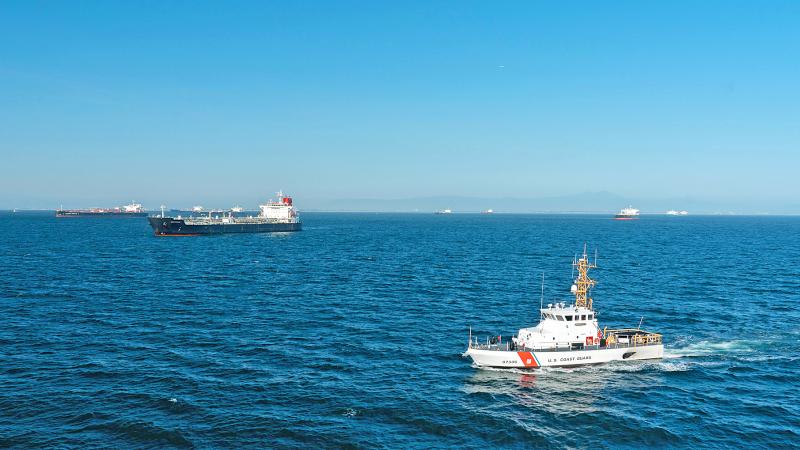The US Coast Guard (USCG) is basing Enhanced Response Cutters in the western Pacific for maritime security missions, the US national security adviser said on Friday, citing illegal fishing and harassment of vessels by China.
US National Security Adviser Robert O’Brien in a statement said that the coast guard also planned to evaluate next fiscal year the feasibility of basing Fast Response Cutters in American Samoa in the South Pacific.
The statement described the US as a Pacific power and added that China’s “illegal, unreported and unregulated fishing, and harassment of vessels operating in the exclusive economic zones of other countries in the Indo-Pacific threatens our sovereignty, as well as the sovereignty of our Pacific neighbors and endangers regional stability.”

Photo: AFP/US Coast Guard/Aidan Cooney/Handout
It said US efforts, including by the coast guard, were “critical to countering these destabilizing and malign actions.”
“To that end, the USCG is strategically homeporting significantly enhanced Fast Response Cutters ... in the western Pacific,” the statement said, without detailing where the vessels would be based or how many were involved.
O’Brien said the new-generation coast guard vessels would conduct maritime security missions, such as fisheries patrols, and enhance maritime-domain awareness and enforcement efforts in collaboration with “regional partners who have limited offshore surveillance and enforcement capacity.”
“Enhancing the presence of the USCG in the Indo-Pacific ensures the United States will remain the maritime partner of choice in the region,” the statement said.
The coast guard did not immediately respond to a request for comment on the statement, which came just ahead of a planned visit to Asia by US Secretary of State Mike Pompeo.
Pompeo led a meeting of foreign ministers from India, Japan and Australia this month in Tokyo, a grouping Washington hopes to develop as a bulwark against China’s growing assertiveness and extensive maritime claims in the region, including to most of the strategic South China Sea.

ACTION PLAN: Taiwan would expand procurement from the US and encourage more companies to invest in the US to deepen bilateral cooperation, Lai said The government would not impose reciprocal tariffs in retaliation against US levies, President William Lai (賴清德) said yesterday, as he announced five strategies to address the issue, including pledging to increase Taiwanese companies’ investments in the US. Lai has in the past few days met with administrative and national security officials, as well as representatives from various industries, to explore countermeasures after US President Donald Trump on Wednesday last week announced a 32 percent duty on Taiwanese imports. In a video released yesterday evening, Lai said that Taiwan would not retaliate against the US with higher tariffs and Taiwanese companies’ commitments to

Intelligence agents have recorded 510,000 instances of “controversial information” being spread online by the Chinese Communist Party (CCP) so far this year, the National Security Bureau (NSB) said in a report yesterday, as it warned of artificial intelligence (AI) being employed to generate destabilizing misinformation. The bureau submitted a written report to the Legislative Yuan in preparation for National Security Bureau Director-General Tsai Ming-yen’s (蔡明彥) appearance before the Foreign Affairs and National Defense Committee today. The CCP has been using cognitive warfare to divide Taiwanese society by commenting on controversial issues such as Taiwan Semiconductor Manufacturing Co’s (TSMC, 台積電) investments in the

HELPING HAND: The steering committee of the National Stabilization Fund is expected to hold a meeting to discuss how and when to utilize the fund to help buffer the sell-off The TAIEX plunged 2,065.87 points, or 9.7 percent, to close at 19,232.35 yesterday, the highest single-day percentage loss on record, as investors braced for US President Donald Trump’s tariffs after an extended holiday weekend. Amid the pessimistic atmosphere, 945 listed companies led by large-cap stocks — including Taiwan Semiconductor Manufacturing Co (TSMC, 台積電), Hon Hai Precision Industry Co (鴻海精密) and Largan Precision Co (大立光) — fell by the daily maximum of 10 percent at the close, Taiwan Stock Exchange data showed. The number of listed companies ending limit-down set a new record, the exchange said. The TAIEX plunged by daily maxiumu in just

‘COMPREHENSIVE PLAN’: Lin Chia-lung said that the government was ready to talk about a variety of issues, including investment in and purchases from the US The National Stabilization Fund (NSF) yesterday announced that it would step in to staunch stock market losses for the ninth time in the nation’s history. An NSF board meeting, originally scheduled for Monday next week, was moved to yesterday after stocks plummeted in the wake of US President Donald Trump’s announcement of 32 percent tariffs on Taiwan on Wednesday last week. Board members voted to support the stock market with the NT$500 billion (US$15.15 billion) fund, with injections of funds to begin as soon as today. The NSF in 2000 injected NT$120 billion to stabilize stocks, the most ever. The lowest amount it